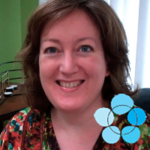 By Sarianne Gruber
By Sarianne Gruber
Twitter: @subtleimpact
About Lisa Emrich, Chair of Communications for iConquerMS™
Lisa possesses an aura of optimism and heart. Probably the two most key qualities needed for bringing patients like herself with Multiple Sclerosis to join together, to bring their data together and to fight their disease. At the Health DataPalooza held earlier this month in D.C., I had the pleasure of speaking with Lisa to learn more about her and the work she is doing for iConquerMS™. Ten years ago she was diagnosed with Rheumatoid Arthritis and MS. Five years prior to her MS diagnosis, she experienced temporary blindness, optic neuritis. For MS patients, the disease can present in a variety of ways, and just like Lisa, it could take a long time to make a final diagnosis. iConquerMS™ is a new initiative by and for persons living with MS. It puts the patient at the center of research in the fight against MS. Today, there are 2,000 members onsite, with an aggressive target goal of 20,000. For more information on the iConquerMS™ initiative, please visit the website.
 Welcome Lisa. Can you share a little about yourself and your current work?
Welcome Lisa. Can you share a little about yourself and your current work?
I am actually a professional musician. I play French horn and piano. And that is what I do for a living. I am a classically trained musician. Currently, I am blogger. I have become a health activist online. I write for several health-related websites, multiple sclerosis specific. I am very active in the MS online community. And last year, I became involved with iConquerMS™, which is an initiative established by the Accelerated Cure Project for MS in Boston, collaborating with technology folks at Arizona State and Feinstein Kean Healthcare, with funding from PCORI. It is a patient-powered research network that is part of the PCORI network of patient research and clinical research networks. At iConquerMS™, I am the Chair of the Communications Committee. And on our committee, about half of the people have MS and the other half are from Feinstein Kean Healthcare and the Accelerate Cure project. We come from many different directions and half of us have MS, which is part of the patient-driven aspect of this community.
How have you been able to use technology to help you connect with patients?
As a MS blogger, naturally I started (connecting with people) through blogs. Because I have been in contact with many different people online through blogs, through forums, social media platforms, being in touch with patients in the online communities using Facebook and Twitter, websites like HealthCentral.com and multipleclerosis.net, and things where patients online are interacting with each other, I try to go where they are to encourage them to sign up and participate with iConquerMS™. We have also used advocacy organizations to reach patients populations and the next step to work through clinicians so we can have them reach their own patients to also encourage them to participate.
What are some the first touch points you have in place for a patient to join the online community? What is the process for the patient to join?
If you go to the website, there is public facing part of the website and you can check out the information about the project itself. In order to participate, registration is required. And part of the process, one has to agree to informed consent agreement. It is expected upfront that patients should read through the informed consent to know what is going to be done with their information. And so they agree to that. It is an approved IRB type study that has gone through review board and has been approved. Once they are registered, they then can start sharing their data. They can answer surveys. Some are just demographic surveys. Some have been used during other clinical trials to measure different types of functions or abilities, and different aspects of your neurological system. And there will be other surveys that will be created to specifically answer research questions. Patients can also on the website participate in a forum that is only available behind the sign in process. There are threads, questions, topics, and patients can communicate with each other. They can do so anonymously by customizing their id. Patients, with their data, they can see where they fit in the community, so there is feedback as well. It is not like you throw your information out there and then not knowing anything about it. You start to see where you fit in different patterns. There is also access to the MS discovery forum, which is aimed more at neurological professionals, but there are many patients who are interested in that higher level of scientific information.
Are they looking to do research and studies with the data you are collecting? Anticipating a future a source of Big Data?
Yes, with each little bit of information from each of these surveys and electronic health records that could be uploaded and shared, and the more data points you can bring together with hopefully 20,000 people then you have a big data base that you can data mine. But yes, so it’s not just a onetime survey and looking at answers there. It’s going to be longitudinal studies, and people come back so you can see information horizontally but not just a slice at one point. You can eventually, when you have enough people participating, you can then start to look at characteristics of females between 40 and 60 who have had a certain experience, who have tried this particular therapy and see how the experience has affected something else. If you get enough people together you can start to pinpoint and become more personalized. There are studies published recently that look at patients that have taken one particular medication and switched to another particular medication to see what happens in between the transition time or when they switched, to see if it affected them negatively or positively. It would interesting to have historical data to see drug A then drug B and then maybe drug C or drug D to get more complex then just two.
Have there been any personal benefits for you being a part of this organization?
One personal benefit is that I can actually participate. I have been unable to participate in other research trials because I don’t fit the inclusion criteria for most clinical research. And this is an initiative where there is no inclusion criterion. For MS or suspected MS, there is a very broad range of what MS is. Many people can be included. And some, they are too old or don’t fit study criteria, or have complicated diseases and co-morbidities that would exclude them, but here they can participate. For myself, I have been able to actually contribute something. And this also good thing, I am actually doing something for a greater good. It just feels good!
About iConquerMS™
The initiative was established by the Accelerated Cure project for MS in Boston collaborating with Arizona State University and Feinstein Kean Healthcare with funding from PCORI (Patient-Centered Outcomes Research). Patient Powered Research Network that part of PCORI network of patient research and clinical research networks institute, an independent, non-profit organization authorized by Congress in 2010 that funds research to provide patients, caregivers and clinicians with evidence-based information needed to make better-informed healthcare decisions. This institute was made possible by the Affordable Care Act. The nine MS clinics in the Accelerated Cure Project network have contributed their expertise and resources, and will help lead the iConquerMS™ data collection and research activities as other MS Clinics become involved. They have created a patient portal where patients could join and contribute their data and be a part of this proactive community to accelerate MS research- an empowering organization for persons living with MS. Please visit the iConquerMS website to learn more and please share with others who would like to participate.
